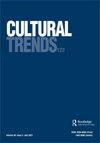Beyond reconciliation, towards regeneration: social circus in Northern Ireland
IF 1.3
2区 社会学
Q1 CULTURAL STUDIES
引用次数: 0
Abstract
This article acknowledges for the first time in an academic context the significant role played by social circus in conflict transformation across Northern Ireland and, more specifically, urban regeneration in Belfast after the signing of the Good Friday Agreement. The focus is on the Belfast Community Circus School (BCCS) and the annual Festival of Fools, which emerged from the social mission and practical delivery of BCCS activities. BCCS was founded in the mid-1980s to offer children and young people in Belfast an alternative, creative outlet for their feelings and to establish “common ground” between communities amid conflict. This essay takes its lead initially from BCCS founders, reconsidering their motivations and the fundamental tenets of the School – as expressed by teachers and former pupils – alongside other studies of social circus in action around the world throughout a similar period. It also theorises the political intent and impact of BCCS through reference to the performance philosophy of Alan Read. Evidence in support of the argument is drawn from a range of available sources including policy and strategy documents, annual reports, performance evaluations, and interviews with key figures within the organisation. From this body of evidence, it becomes clear that, in the move towards what we might term (after Read) a Republic of Play, a change in BCCS, its own sense of identity and purpose within society was inevitable, as Northern Ireland continues the process of reconciliation and post-conflict transformation. Finally, then, the article attends to the recent transformation within BCCS itself, which in 2021 became Circusful: an organization with its own set of social and economic goals.超越和解,走向重生:北爱尔兰的社会杂耍
本文首次在学术背景下承认了社会马戏团在北爱尔兰的冲突转变中所发挥的重要作用,更具体地说,是在耶稣受难日协议签署后贝尔法斯特的城市再生。重点是贝尔法斯特社区马戏学校(BCCS)和一年一度的愚人节,这是从社会使命和BCCS活动的实际交付中产生的。BCCS成立于20世纪80年代中期,旨在为贝尔法斯特的儿童和年轻人提供另一种创造性的情感发泄渠道,并在冲突中建立社区之间的“共同点”。本文首先从BCCS的创始人开始,重新考虑他们的动机和学校的基本原则——正如老师和以前的学生所表达的——以及在类似时期内世界各地对社会马戏团的其他研究。本文还借鉴艾伦·里德的表演哲学,对BCCS的政治意图和影响进行了理论化。支持这一论点的证据来自一系列可用的来源,包括政策和战略文件、年度报告、绩效评估以及对组织内关键人物的采访。从这些证据中,我们可以清楚地看到,随着北爱尔兰继续和解和冲突后转型的过程,在走向我们可能称之为(在Read之后)玩耍共和国的过程中,BCCS的变化,其自身在社会中的认同感和目的是不可避免的。最后,本文关注了BCCS内部最近的转型,该组织在2021年成为Circusful:一个拥有自己的社会和经济目标的组织。
本文章由计算机程序翻译,如有差异,请以英文原文为准。
求助全文
约1分钟内获得全文
求助全文

 求助内容:
求助内容: 应助结果提醒方式:
应助结果提醒方式:


